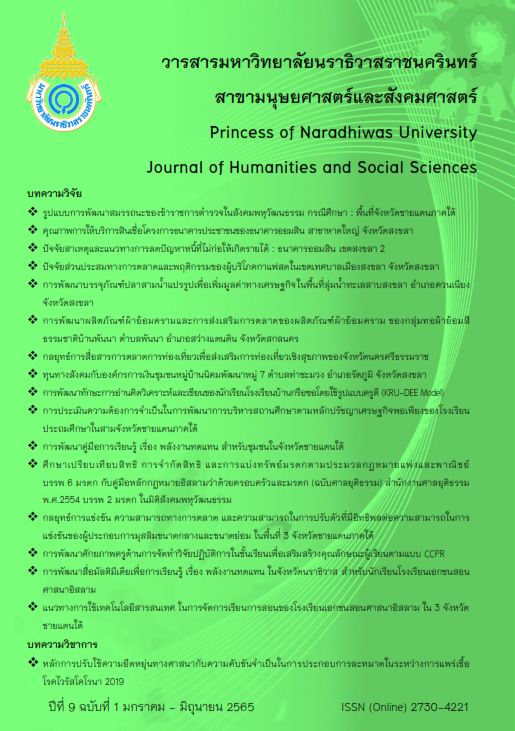Principles of Religious Flexibility in Performing Prayers during the Covid-19 Crisis
Main Article Content
Abstract
The Covid-19 pandemic has unavoidably affected people’s ways of life, not only changing their daily routine, but also the ways they perform religious duties, specifically performing obligatory prayers and congregational prayers (Friday prayers). As the prayers are the second of the five pillars in Islam, it is obligatory for every Muslim man to perform the prayers collectively (known as Jama'ah) at mosque. However, Islam embodies flexibility that allows the Muslim men to either practice social distancing during the prayers at mosque or permit them to perform the prayers at home in specific circumstances such as the Covid-19 crisis.
This flexibility leads to amendment to Islamic call to prayers from the usual 'hayya alas-salah' or 'come to prayer' to 'al-salatu fi buyutikum' or 'pray in your homes'. Some Islamic scholars viewed this amendment as Sunnah or 'the practices of the prophet Muhammad'. However, some viewed this as Wajib or 'obligatory'. There are two perspectives of Islamic scholars on the Jama'ah and the Friday prayers in this circumstance. First, some scholars perceived that, according to Al-Quran and Al-Hadith, both prayers are obligatory. Second, based on some other scholars’ perspectives, while the Jama'ah prayers are Al-Wajib al-Kifa'I (collective obligation), which means Nadab (recommendation), the Friday prayers are not obligatory in this circumstance for their safety and convenience. This should be taken into consideration in order to protect lives from the Covid-19 pandemic.
Article Details

This work is licensed under a Creative Commons Attribution-NonCommercial-NoDerivatives 4.0 International License.
References
กระทรวงสาธารสุข. (2563). ราชกิจจานุเบกษา เล่มที่ 137 ตอนพิเศษ 48 ง วันที่ 29 กุมภาพันธ์ 2563 ประกาศกระทรวงสาธารณสุขเรื่อง “ชื่อและอาการสำคัญของโรคติดต่ออันตราย (ฉบับที่ 3). สืบค้นจาก https://ddc.moph.go.th/law.php?law=1
มหาวิทยาลัยจอห์นส์ฮอปกินส์. (2563). ไวรัสโคโรนา : ที่มา อาการ การรักษา และการป้องกันโรค โควิด-19. สืบค้นจาก https://www.bbc.com/thai/features-51734255
สำนักงานจุฬาราชมนตรี. (2563). ประกาศจุฬาราชมนตรี เรื่อง มาตรการป้องกันการแพร่ระบาดของโรคติดเชื้อไวรัสโคโรนา 2019 (COVID-19) ว่าด้วยเรื่อง การละหมาดวันศุกร์ การละหมาดญะมาอะห์ และการจัดกิจกรรมและการรวมตัวกันเป็นกลุ่มสำหรับในเขตพื้นที่กรุงเทพมหานคร ปริมณฑล และในพื้นที่ที่รัฐบาลประกาศห้ามรวมตัว(ฉบับที่1/2563). สืบค้นจาก https://www.skthai.org/th/news/89753.
Abu Sulaiman. (1423). Fiqh al –Dhururah wa Tatbeeqatihi al- Muasarah Afaq wa Abaad, SilsilahMuhadharaat al- Ulama’ al- Bariseen,ruqom 2, al- Bank al – Islami lilbuhuth wa al- Tadreeb. Jeddah.
Abu Zahrah. (1958). Usul al- Fiqh, Dar al- Fikr al- Arabi.
Ahmad. (1996). Musnadal- Imam Ahmad bin Hambal, Ruqmun 5866, Muassah al- Risalah, Bairut.
Al- Ammari. (1440). Ahkamkaul al- Muassin. Makkah famary1@gmail.com
Al- Ansari. (1991). al- Hudud al- Anifahwa al- Ta’rifat al- Daqiqah, Markaz Jumiah al-Majid lilsaqafah wa al – Turath, Bairut.
Al- Bukhari. (2002). Sahihal- Bukhari, Dar IbnKthir, Bairut.
Al- Dardir. (n.d.a). al- Sharh al- Kabirma’Hashiyah al- Dassuki, Dar al- Fikr, Bairut.
Al- Dardir. (n.d.b). al- Sharh al- Dhagirala Akrab al- Masalikila Mazhab al- Imam Malik, Dar al-Ma’rif, misr.
Al-Ghazali. (1322). al-Mustashfa minIlmi al- Usol, Muassah al- Halbi wa Shurakauhulinnashr wa al- Tausi’.
Al- Jurjani. (1938). Kitab al-ta’rifat, Sharikah Maktabah wa Matbaah Mustafa al- Hakbi, misr.
Al –Kasani. (2003). Bidaia al- Sinaia fi Tarteeb al- Shara-ia,T2, Darul al- Kutub al- Ilmiyah, Bairut,
Al –Razee. (1992). Ahkam al- Quran, p1, Dar al – Mashaf , Sharikah Maktabah wa Matbaah, misr.
Al- Zuhaili. (1985). Nadhariah al-Dhururah al- Shariah Muqarantan maa al- Qanoon al- Wadiah, Muassah al- Risalah, Bairut.
Ali al - Qurrah Daghi. (2020). Salah al - Jamaahwa al - Jumuah fi zaman al - Waba’ Corona. Retrieved from https://arabicpost.net.
Ali Haidar. (2003). Durru al- Hukkam Sharh Majallah al- Ahkam, Dar Ilmu al- Kutub, al- Riyadh.
Al-Ma’nawi. (1990). al- TawfiqalaMuhimmat al- Ta’reef, Dar al- Fikr al- Muasir, Bairut.
Al-Nawawi. (n.d.). al- Majmu’ Sharh al- MuhazzablilShirazi, Maktabah al- Irshad, Jiddah.
Al-Sarkhasri. (1421). al-Mabsoot, Dar al- Fikr, Bairut.
Al-Shawkani. (1982). Nailu Aotor, Dar ibn Qaiyim, al - Saudiah.
Al-Tirmizi. (1996). al- Jamia’ al- Kabir, Dar al- Gharbi al- Islami.
Ibn Hibban. (n.d.). Sahih Ibn Hibban, Dar al- Maarif. Misr.
Ibn Juza. (n.d.). Qawanin al – Ahkam al- Shariah wa Masail al- Furu’al- Fiqhiah, Dar al-Ilm lil Malayin, Bairut.
Ibn Majah. (n.d.). Sunan Ibn Majah,Matbah Dar Ihya al- Kutub al- Arabiah.
Ibn Qudamah. (1984). al- Mugni wa al- Sharh al- Kabir, Dar al- fikr, Bairut.
Ibn Taimiah. (2004). Majmu’fatawa, Wizarah al- Su’uoon al- Islamiahwa al- awqafwa al- Da’wah, Saudiah.
Malik bin Anas. (2016). Al- Muata’, Markaz al- Buhooth wa Tikniah al- Ma’lumat,Dar al- Ta’sil.
Muhammad Alish. (n.d.). Manah al- Ja’lilala Mukhtasar al-Allamah Khalil, al- Ma’lumah al- Nasr, Bairut.
Muslim. (1991). Sahih Muslim,Matabia al- Wafaa’, al- Mansurah.
Sharkasi. (1988). al- Bahr al- Muheet fi al- Usol al- Fiqh, Wizarah al- Auaqaf wa al- Shuuoon al- Islamiah, al- Kuwait.
Yaman Talaat. (2020). Hukmun tarikah Zalah al – Jumuah wa al - Ja’maah manaan litafasshiFairuscoronag. Retrieved from https://www.elbalad.news/4221815


